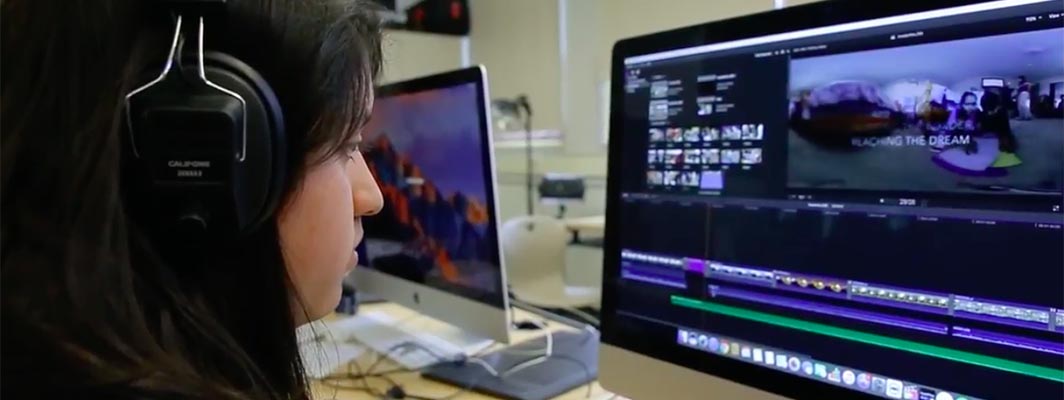
January 18, 2019 | By Stefani Pautz Stephenson, Josh Weisgrau and Elyse Gainor
Powerful learning must be authentic and challenging. When students are engaged in work that has an audience and impact outside of their classrooms, they are more motivated to persist in overcoming learning challenges. Authentic and challenging lessons develop the habits of mind that students need to be empathetic global citizens and engaged members of their communities.
Learning experiences that challenge students to perform at the highest reaches of their abilities while tackling authentic and meaningful goals can drive students toward achieving their most ambitious learning goals.
Cultural background influences the way students learn and communicate, which may be different from their teachers. When teachers develop culturally responsive teaching practices, they are better equipped to create authentic learning experiences. Culturally responsive teaching is summarized by Jenny Muñiz at New America as “an approach that challenges educators to recognize that, rather than deficits, students bring strengths into the classroom that should be leveraged to make learning experiences more relevant to and effective for them […]Educators who practice culturally responsive teaching set rigorous learning objectives for all of their students and they continually build helpful bridges between what students need to learn and their heritage, lived realities, and the issues they care about.” When educators use culturally responsive practices, they provide opportunities for students to meet high standards and engage in relevant learning experiences as they develop and sustain their cultural identities.
Educators begin practicing culturally responsive teaching when they develop awareness of their own cultural context and the cultural lens they bring to the classroom. This enables educators to recognize and confront their own biases that impact how they see and interact with students, Black and Brown students in particular. Additional culturally responsive teaching practices include learning within the context of culture, reshaping the curriculum so that students are engaged with authentic issues related to diverse cultures, and more.
Research shows that student engagement increases when relevance, value, and authenticity are maximized. Students are more invested in learning when they know why they’re learning something—and it’s important to note that not all learners will be motivated by the same purpose.
Specifically, when students learn with compassionate or altruistic intentions and can connect their learning to their ability to help others, they view their work as more meaningful and beneficial. Cultivating these intentions has been shown to enhance students’ persistence.
Technology can afford students and teachers new opportunities to connect with real problems and real audiences. Educators can use frameworks and pedagogical approaches such as Challenge Based Learning, maker learning, and computational thinking to develop projects with students that serve their communities and prepare them to become the next generation of leaders and change-makers.
As one student in Hayward, California, explained, “I hope to change the community by setting an example and inspiring others to take a risk or challenge in life.”
Having high expectations for all learners is a core value in education. Learning that isn’t mentally challenging will never achieve the goal of feeling personal and authentic to students. Research shows that communicating high expectations and pushing learners to perform at the top of their abilities helps motivate students to reach their potential and keep them engaged in learning. Achieving a desirable level of difficulty pushes learners past their current abilities, engages the brain deeply, and lays the foundation for powerful learning. Adjusting to feedback from ongoing formative assessment during learning allows educators to offer the help students need so they continue to feel the right level of productive struggle.
This point reinforces the importance of asset-based approaches, a practice within culturally responsive teaching. When educators take an asset-based approach, they view and interact with students based on their strengths rather than perceived deficits. Taking an asset-based teaching approach is especially important for white educators, who often have lower expectations of Black and Brown students.
Educators can help students develop the habits of mind for productive struggle by guiding their development of stronger executive function skills to support success and resilience in challenging learning environments. When students see failure as an opportunity to find out what they do not know and to adjust their learning strategies rather than as an indication of self-worth, they’re more likely to persevere. Educators can practice these five strategies for cultivating a growth mindset to help them translate high expectations into student success
Educators who focus on creating an authentic and challenging learning environment help learners understand that the biggest challenges they will be called on to solve go beyond and across all academic disciplines. They cultivate empowered learners who are purposeful, motivated, resourceful, and strategic.
A simple way to make learning authentic is by identifying connections between your curriculum and your local community. With this information, design a learning experience that allows students to learn (literally and figuratively) outside the walls of the school.
You can find inspiration for designing these types of experiences in this story from Charlottesville, Virginia. Students went beyond the textbook and used their community as a resource for learning about the Civil War. In the culminating event, students chose an “untold story” from their community and designed a memorial monument, which was then showcased to the community.
Ready for more? Use these resources to support your design of authentic and challenging learning experiences:
If you are an educator creating powerful learning experiences for your students that are authentic and challenging, consider earning some of these educator micro-credentials to be recognized for and share your accomplishments:
Follow us for the latest updates on this series on Powerful Learning and use our resources to implement Powerful Learning in your teaching and learning practice.
Blog updated in September 2020.
Citations
By Lauren McMahon and Heather Dowd